

Sign in to your Collider account
[Editor's Note: The following contains spoilers for Dune: Prophecy Season 1, Episode 4]
The Big Picture
- Collider's Perri Nemiroff sits down with Dune: Prophecy 's Mark Strong and Jodhi May to discuss Episode 4, "Twice Born."
- During their chat, Strong discusses Emperor Javicco Corrino's insecurities, how Travis Fimmel's character Desmond Hart helped him further explore his own character, and what the Emperor's concerns are going forward.
- May shares why she was excited to join the series, how Empress Natalya views her husband's power, and the consequences of that final scene in Episode 4.
As we near the end of Max's Dune: Prophecy Season 1, tensions and stakes are rising. While Valya (Emily Watson) and Tula Harkonnen (Olivia Williams) struggle to maintain control for the Sisterhood, House Corrino finds itself under the weak grasp of Emperor Javicco, played by Mark Strong. In Episode 4, "Twice Born," however, things begin to take an interesting turn as Javicco and Empress Natalya, played by Jodhi May, embrace the deadly powers of their mysterious visitor, Desmond Hart (Travis Fimmel).
While talking to Collider's Perri Nemiroff, Strong and May share why Dune: Prophecy offered each of them a unique experience as actors and how they explored their characters throughout the scenes. They also discuss Javicco's insecurities, their power dynamic, and how Hart's influence over the court in that final scene will affect House Corrino in future episodes. You can watch the full conversation in the video above or read the transcript below.
'Dune: Prophecy' Explores Certain Characters with "More Creative Freedom"
The series allows its cast to explore lesser-known characters in the universe.
PERRI NEMIROFF: When you first took these roles, what single part of making Dune: Prophecy were you most excited about and then also, can you tell me something about the experience of working on this show that wound up being more creatively fulfilling than you ever could have imagined at the start?
JODHI MAY: Simply put, I obviously saw the films, the David Lynch film and the Denis Villeneuve films, and so it was hugely exciting to become a part of this universe. For me, it's kind of the cream of the cream of the sci-fi world, just in terms of its surrealism and the richness of the characters, so I was thrilled to become a part of that. And I guess creatively, for me, it was exciting because my character is not so explored. So, to an extent, there was a bit of a sense of her having a blank slate as an actor and having quite a lot of creative freedom. Again, for me, Alison [Schapker] just writes these incredibly ballsy, incredible female characters, so that's so refreshing, and I love the fact that very many of them are over the age of 40, which we obviously need to see more of.
MARK STRONG: The scope and the vision and the fact that it's a rich world that is full of so much incident. You have all these books, you have all this source material, there's an endless amount of information to draw from. And as Jodhi says, to initiate a character, to play somebody who's never been played before, is always a joy, and the knowledge that technology has advanced so much that you can create a really believable universe. Some of the shots of the exteriors are really quite extraordinary. But yet within that you have this medieval court flavor of people interacting and trying to get one over on each other, who's in, who's out, who can you trust? The stuff of life. So, really, all of that intimate stuff plus the scope and the vision of the project.
I wanted to ask you both about finding your characters because you both play very complex individuals who are carrying around quite a bit. I was wondering if you had an “aha” moment with them where you were trying to find your character, and then you did something, or thought of something that made you say to yourself, “I get who they are now?"
STRONG: For me, I think it was the interaction with Travis [Fimmel’s] character, because to play an emperor, you would normally assume the guy's in control of everything — he's the head honcho, he has confidence, he has ability. What's interesting about him is the fact that he's written with insecurities and an element of paranoia, and I think it was when the interaction with Travis happens, you suddenly realize, “Oh, okay, he now has a tool, or a gladiator, an enforcer who he can use in order to solidify his hold on power.” He suddenly starts to feel a little more confident about everything. I realized that, actually, maybe he's not such a nice guy after all, because he starts as somebody who seems quite beleaguered, but actually, the minute he's offered the opportunity of a weapon that he can use in order to subdue everybody, he jumps at the chance.
MAY: It's really interesting the dynamic that the arrival of his character brings into the court. I think for me what was interesting was that, I don't want to give away any spoilers, but when Empress Natalya starts off, I think we get a sense that she's quite possibly subjugated or there's a degree of real frustration there in terms of her lack of agency if you like. The way that that twists and turns for me was fascinating to be able to play. The “aha” moment for me was how to convey that journey without resorting to obvious choices. So, I'm slightly paranoid about giving away spoilers, and that's all I'm going to say on that. [Laughs]
You're totally safe through Episode 4!
10:49
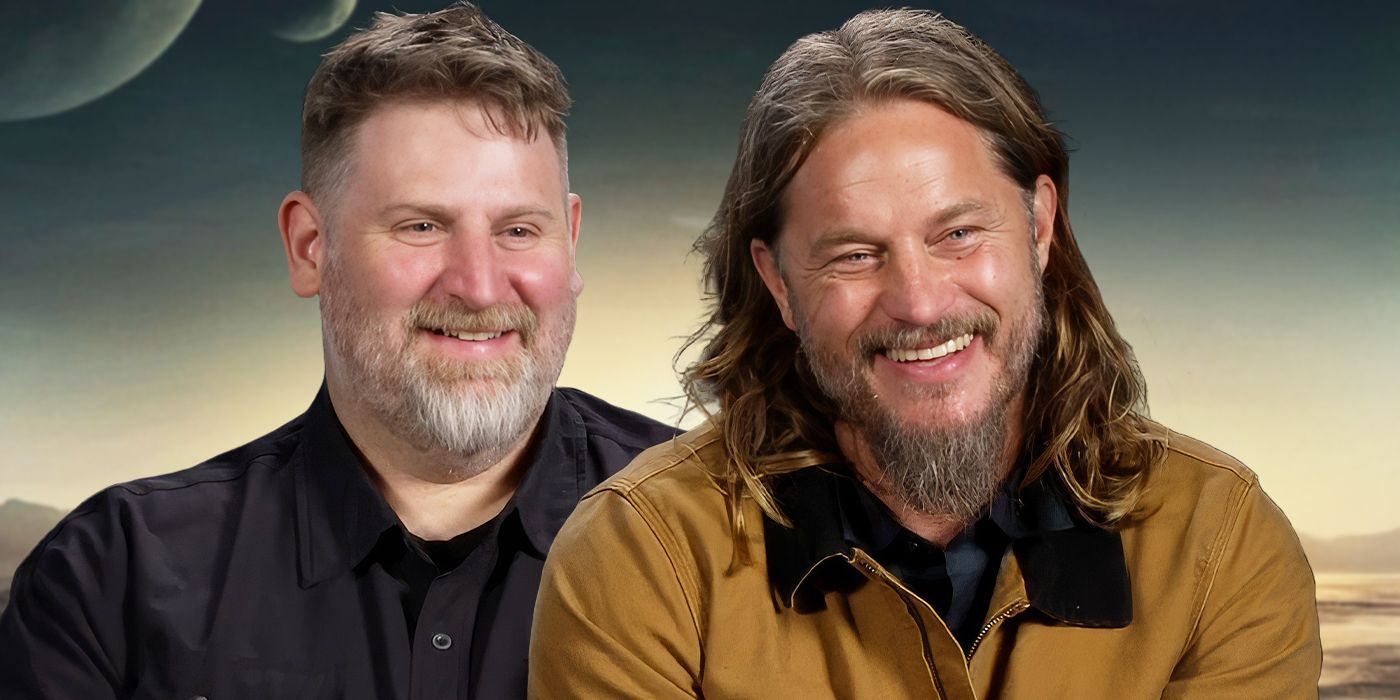
Related
'Dune: Prophecy's Travis Fimmel Explains His Character's "Righteous and Justified" Actions in That Shocking Premiere
Writer Jordan Goldberg and Fimmel reveal their most-anticipated upcoming moments of the season and dig into Desmond's psyche.
There actually is one thing I wanted to follow up on that digs into that a little bit, and I know you're probably going to want to keep the specifics of this secret because it hasn't fully been revealed. I think this happens in Episode 2. There's one point when she tells him, “There was a time when you took my views seriously,” and it was making me wonder, can you give us a little bit of a description of what their relationship was like back in the day, and how it compares to the relationship we see in the finished show?
MAY: We discussed this a bit in rehearsals. I think, certainly from Natalya’s point of view, despite being an arranged marriage, there was love there. I think there has to have been love there at some point for her, because that augments the sense of loss and disappointment and disillusionment that she's encountering in that scene. It feels like someone who has been sidelined in a marriage that's become all about the Sisterhood, all about the Emperor's reliance on Kasha, and there's no relationship left. So, that scene for me is kind of fascinating because it's like seeing a woman being really forced into a corner, and she's got to survive. That sets up that story for her character.
House Corrino "Is Under Fire," But Can Emperor Javicco Protect It?
"The sense of control is just eluding Javicco’s grasp."
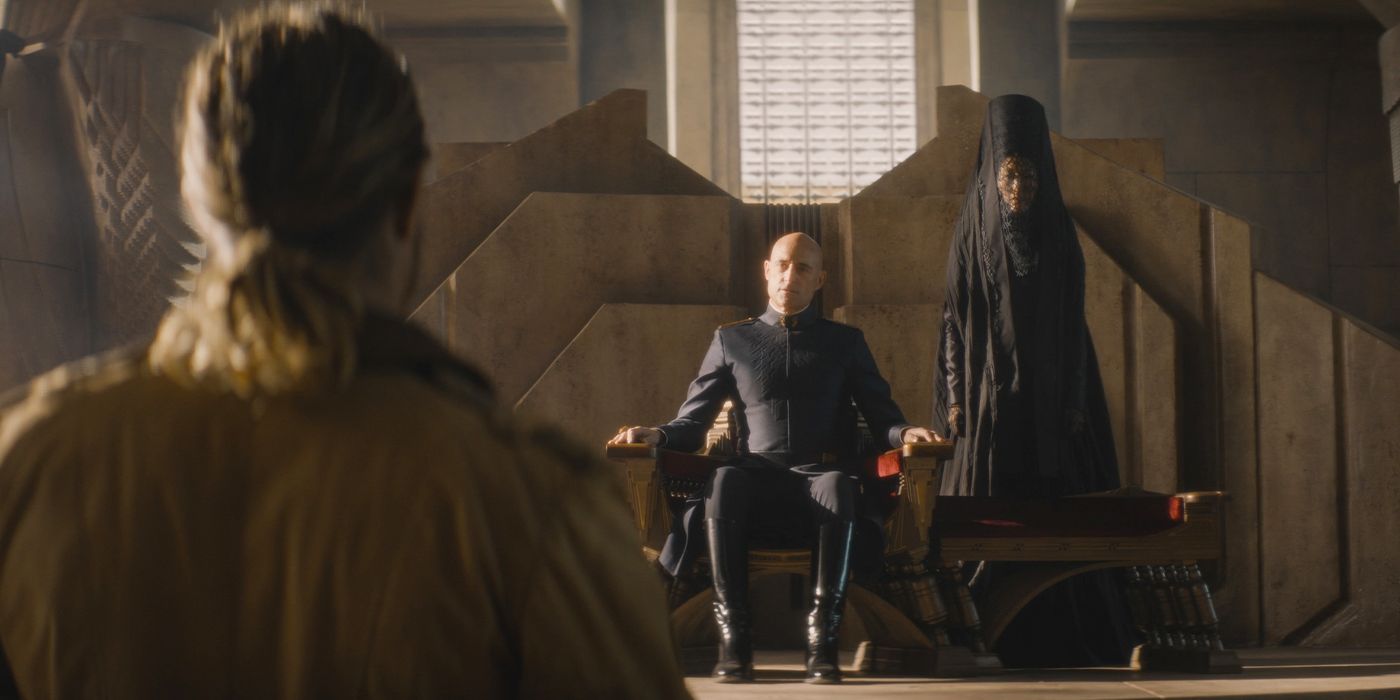 Image via HBO Max
Image via HBO Max To build on some of what you just said a little, I'll throw this question to both of you because I'm curious to hear how your answers will differ. Mark, for you, how would Javicco define what house Corrino stands for at this point in time? And same for Natalya; how would she define House Corrino’s position in the Imperium?
STRONG: For Javicco, they're in pole position. They are the preeminent house because, largely, they were responsible for ridding the universe of the thinking machines, so they have earned their power. Unfortunately for him, he feels in the shadow of a very powerful father who was obviously very good at running the show, and he doesn't have the confidence that he can do that. He's in a world where the house is under fire from all of the other houses. Everybody's trying to get something from him. Specifically in the first episode, he needs this marriage to happen because he needs the weaponry that he's offered in order to manage the spice operation that he has running on Arrakis, which is in trouble. So, for him, House Corrino is the Imperium, but it's under attack.
MAY: As we progress, and since you're talking about Episode 4, it's increasingly obvious to Natalya that the sense of control is just eluding Javicco’s grasp, and action needs to be taken, and this is not a man of action. So, it's really interesting to see how she decides to influence that. And again, with the arrival of Desmond Hart and what kind of opportunity he provides as a catalyst for her to intervene. But it feels, I think, for Natalya, like an emperor who is just a puppet, essentially, and not taking a hard line on thinking machines is just the beginning of losing control of the Imperium for her.
STRONG: There's a wonderful moment in Episode 1 where Pruwet’s thinking machine runs riot through the assembled crowd, and, basically, Natalya tells him off in no uncertain terms, and then you see her literally look to her husband in order to take control of the situation. He totally abdicates all responsibility. In that moment, you realize he doesn't really have her confidence and isn't really suited to running the show.
Pay Close Attention to the "Visual Dialogue" of 'Dune: Prophecy'
"There's an interesting symbolism about some of [the costumes]."
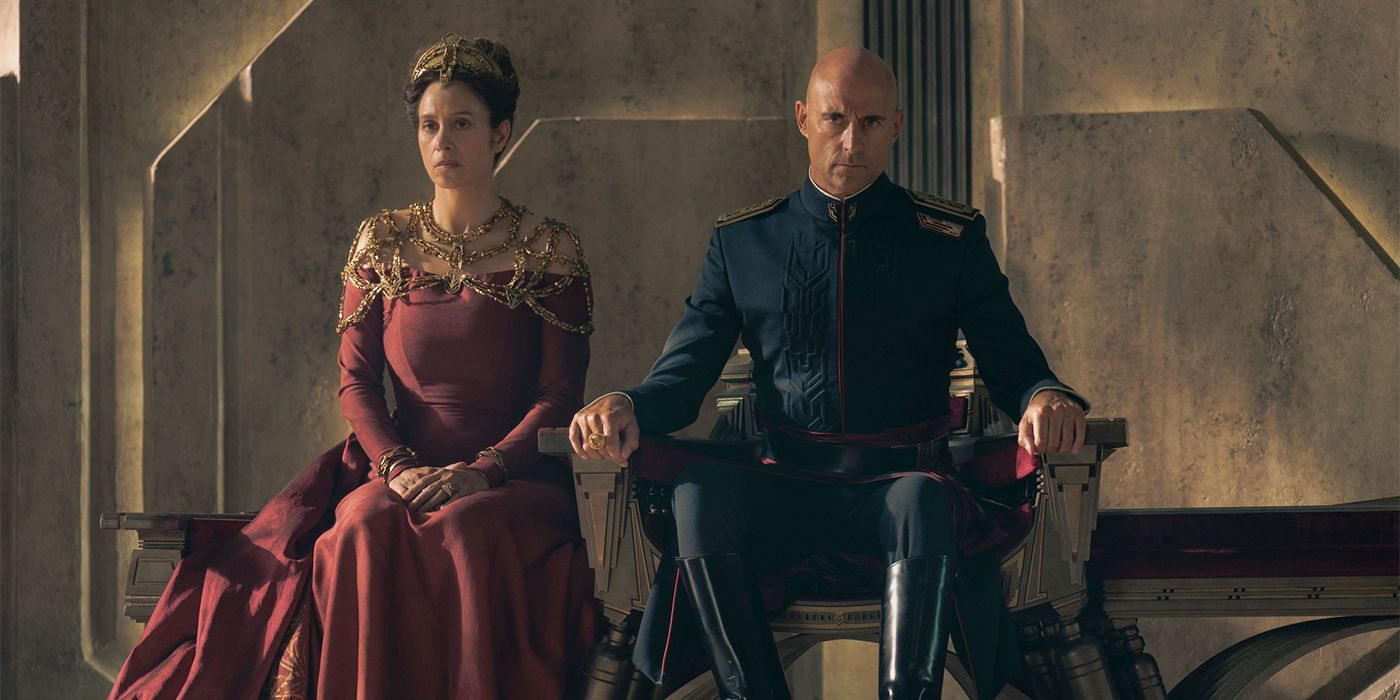 Image via Warner Bros. Discovery
Image via Warner Bros. Discovery Jumping ahead to the tail end of Episode 4 now, there's a pretty significant sequence there, and the first thing I wanted to touch on with that is the costumes. For both of you, can you pinpoint a specific detail of your costume in the High Council scene that speaks to how the two of them have to up their game when presenting themselves to the High Council members?
STRONG: His costume is a very militaristic-looking costume. Initially, the thought was that he might be in robes. We would have a sort of free-flowing, very confident feel to him. But obviously, I think in accordance with the film and the world of Dune, they decided, probably quite rightly, that there should be that very formal, militaristic attire — knee-high boots, shoulder epaulets, medals, and stuff. It makes you stand up straight and makes you present yourself. So, he definitely has elements of perhaps the king and also elements of a general, and that's what that costume does for him.
MAY: I think for me the costumes were really interesting in that there's an interesting symbolism about some of them. There's a piece that Natalya wears in the engagement ceremony that's like a chainmail sort of garment that goes over the top of her dress, and it's at once a piece of armor, but there's also something constraining about that. There's always this kind of visual dialogue going on with the costumes that was incredible in informing the sense of public display and constraint when they're in those scenes. Again, it'll be interesting to see how that evolves, without giving anything away.
Desmond Hart's High Council Display Will Have Consequences
"The architecture of power is completely upended in a way."
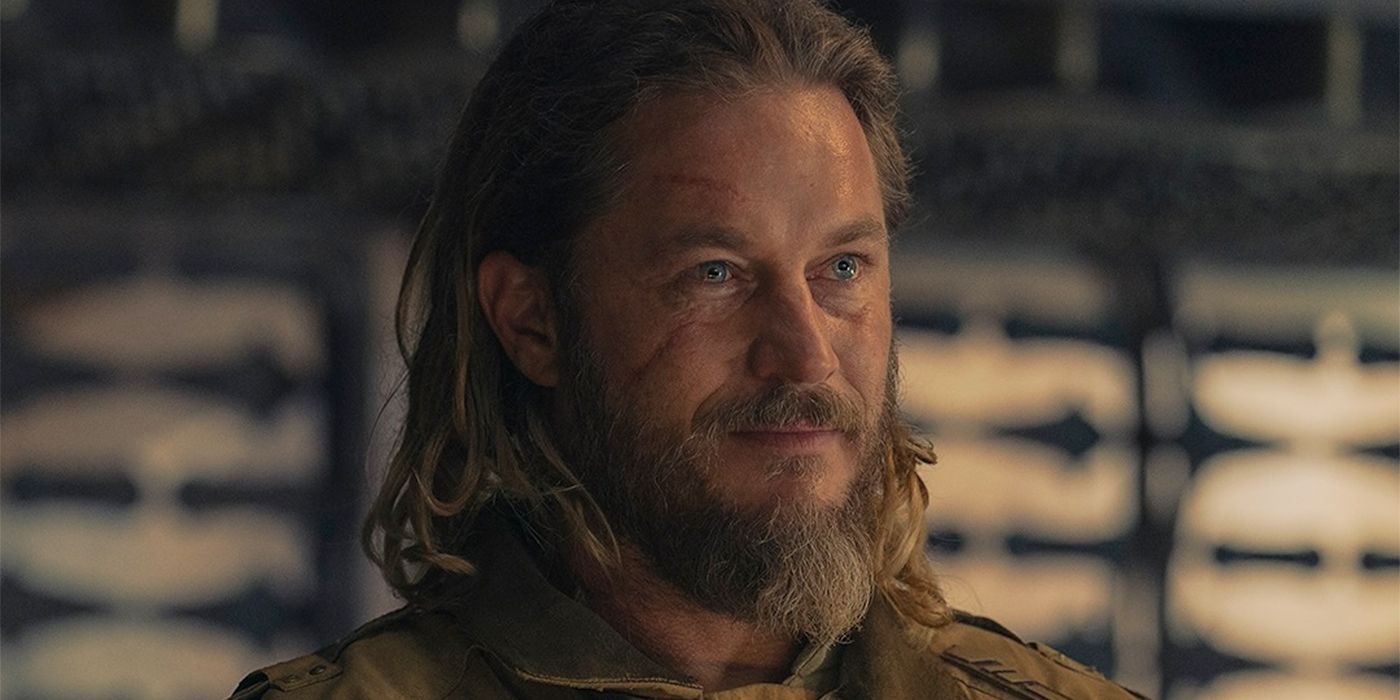 Image via Warner Bros. Discovery
Image via Warner Bros. Discovery Touching on the performances in this High Council scene, I have to ask you both about working with Travis, but also, in particular, watching him command a room in that moment. Is it as wild and engrossing for you on set as it winds up being for us as viewers watching the whole thing play out?
STRONG: Yeah. I mean, we were in that massive hall, all of those people were there, there's no CGI. They were all extras in there. The day came when Travis had to come in and do that and control that room and show his character's power and play it almost like on a stage with all the rest of us there as an audience.
MAY: It's so interesting. For Natalya, that scene is quite incredible because it breaks through the protocol, it breaks through the bureaucracy of the High Council, and the structure, the architecture of power, is completely upended in a way. And it's quite interesting what his character does because there's something very visceral, very instinctive, and I think that speaks to Natalya because it's all about her sense of intuition. So, it changes the dynamics. And yeah, it was incredible to watch. Again, it's an example of how those sets really come into their own and how, as an actor, you can really use the space. It's really interesting, I think, how that just blew open all the possibilities of what's going on, as Mark says, in terms of who is vying for position in the story at that particular point. It's an incredible climax to that episode.
That’s another scene that I caught myself over-analyzing, looking at everyone's body language. In particular, Mark, for you, there's a reaction shot that I wanted to ask you about. After Desmond's big speech, he turns to Javicco and he basically asks him for the approval to kill, and then we get a rather long reaction shot from you. What is it like preparing for a dialogue-less beat like that that has to reflect the complexity of that decision for him?
STRONG: Well, to be honest, those are my favorite bits. Film is visual, so my favorite films are the ones that have the least amount of dialogue, to be frank. If you can have a moment in which you convey information without having to say anything, those are the best challenges. So, I'm really happy that they allowed that moment to live.
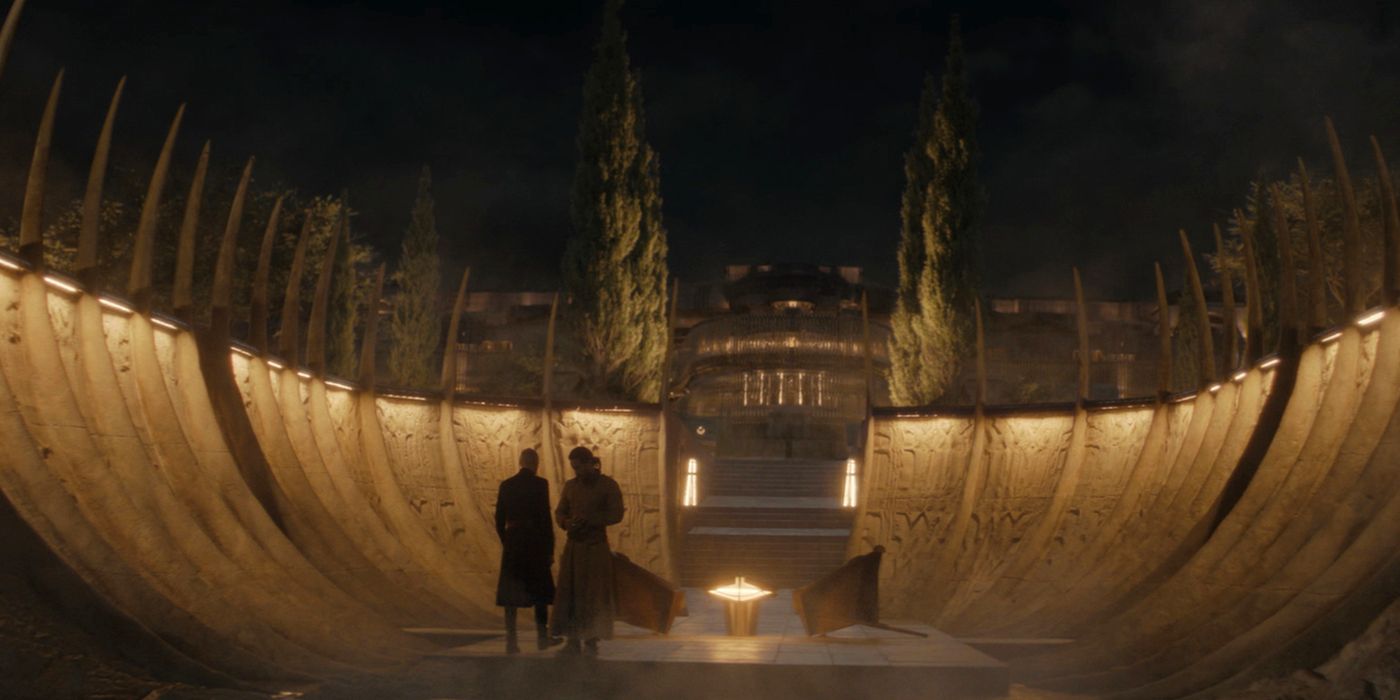 Image via HBO Max
Image via HBO Max To tease what lies ahead, how does this particular incident with Desmond impact how your character feels about him? Do they leave that room more fearful of him or feeling perhaps more powerful because he is on their side?
STRONG: I think the Emperor is very happy to have a weapon, but he's also conscious of the fact that there's possibly a loose cannon and it could lead to problems further down the line.
MAY: I think for the Empress, it's a real game-changer, that scene. Yeah.
Oh, you held back there!
MAY: I did. [Laughs]
New episodes of Dune: Prophecy premiere on HBO Max every Sunday.
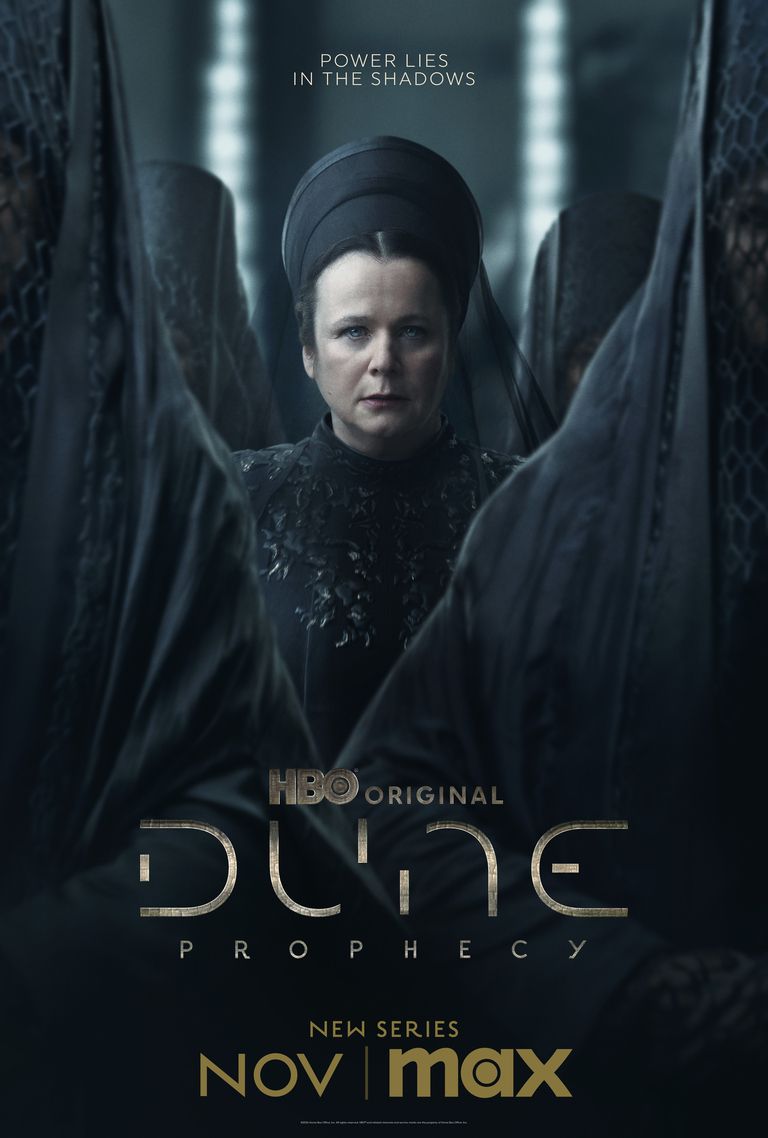
TV series set in the 'Dune' universe which centers on the lives of the Bene Gesserit.
Writers Diane Ademu-John , Kevin J. Anderson , Brian Herbert , Frank Herbert

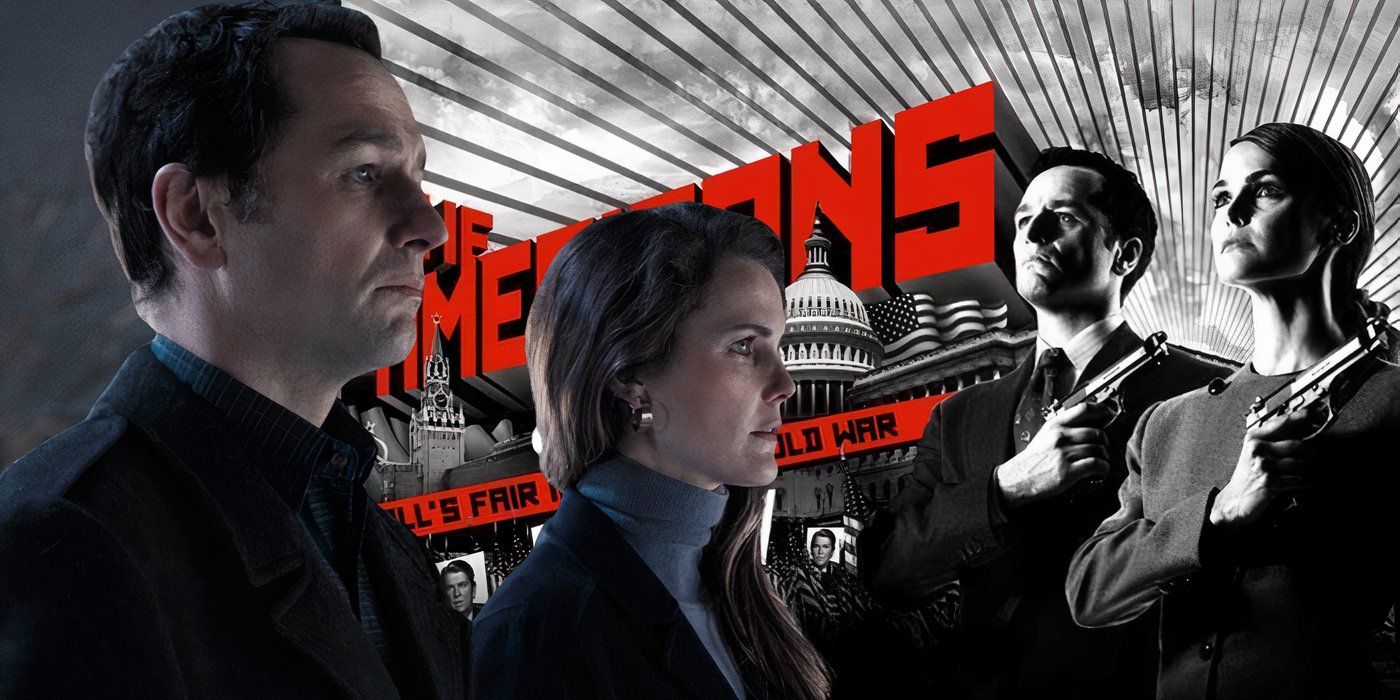
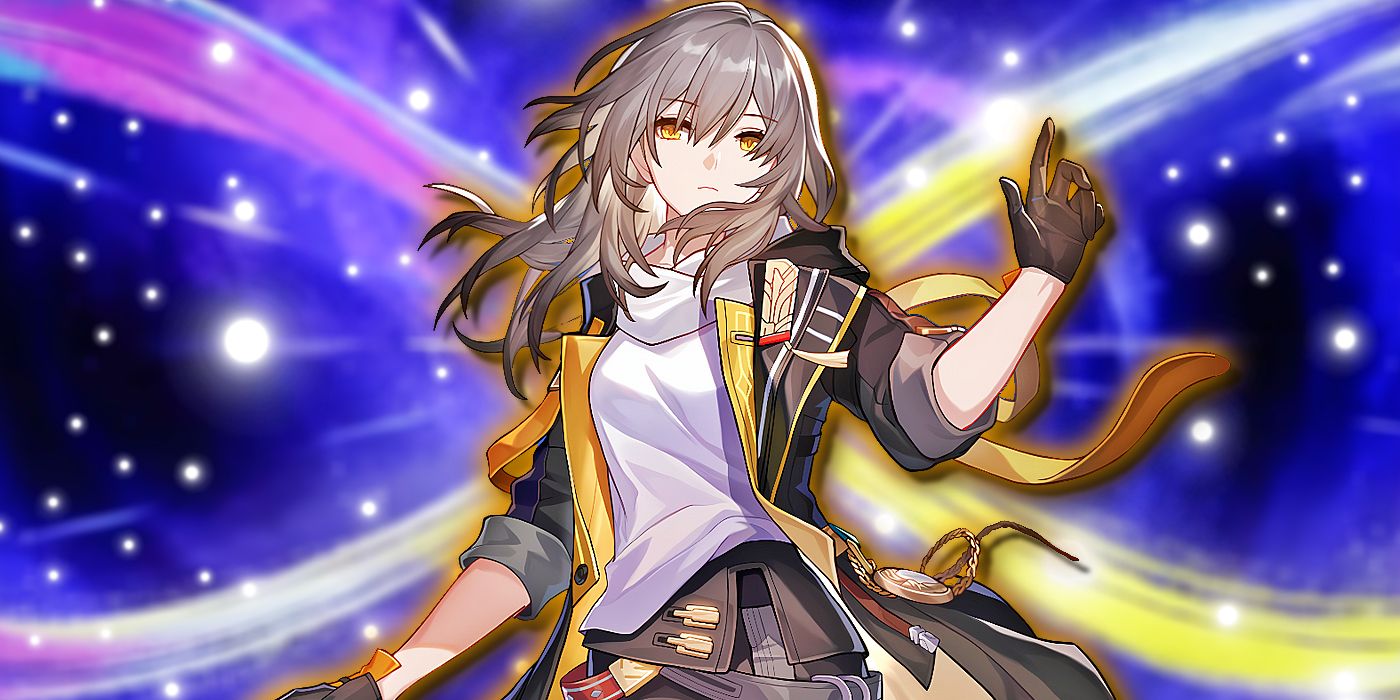
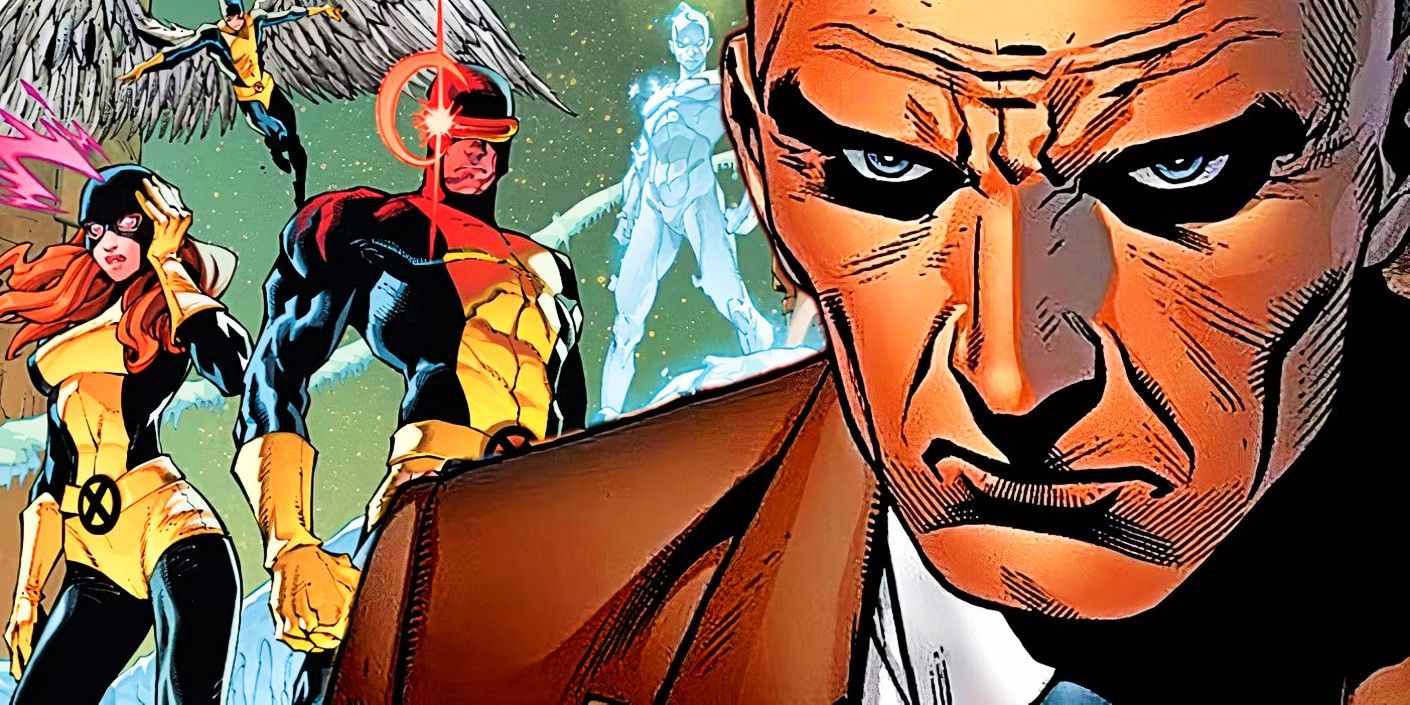





 English (US) ·
English (US) ·